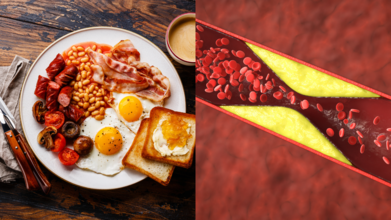- Health Conditions A-Z
- Health & Wellness
- Nutrition
- Fitness
- Health News
- Ayurveda
- Videos
- Medicine A-Z
- Parenting
- Web Stories
3 Long-Term Effects Of Soybean Oil Consumption

3 Long-Term Effects Of Soybean Oil Consumption
Soybean oil has become a household staple in every kitchen around the world and is touted as cheap, versatile, and convenient to use. The oil is produced from the seeds of the soybean plant, which contain polyunsaturated fats in high concentrations, mainly from omega-6 fatty acids that have been tauted as beneficial to heart health. However, as time progresses, new questions are asked regarding soy's long-term health benefits.
According to Dr. Varun Bansal, a cardiologist at Apollo Hospitals, "Soybean oil in moderation will do some good because of the omega-6 fatty acids. High intake has been associated with inflammation, heart diseases, and metabolic disorders."
Here are three major long-term impacts of soybean oil consumption and what it portends for your health.
1. Impact on Heart Health
Soybean oil has a very high omega-6 content. While balancing omega-6 fatty acids with some amount of omega-3 fatty acids could help lower LDL or "bad" cholesterol levels, too much of the former leads to an imbalance in the vital ratio.
He emphasizes, "There is evidence to show that excessive amounts of omega-6 fatty acids can increase inflammation in the body. Over time, this inflammatory state eventually contributes to atherosclerotic plaque formation - two of the major culprits behind heart attacks and strokes.
Research further indicates that soybean oil, aside from its potential inflammatory effects, may not meaningfully increase high-density lipoproteins or lower triglycerides; it is therefore less capable of benefiting cardiovascular health in its totality. The nature of diets that have overdependence on soybean oil results in imbalance between omega-6 and omega-3 fatty acids. This calls for intake of oils with better nutritional profile.
2. Risk Factors for Fatty Liver Disease and Metabolic Conditions
One of the major long-term side effects of excessive soybean oil consumption is that it has the potential to make non-alcoholic fatty liver disease worse. NAFLD is the condition where fat in the liver increases, a problem increasingly common worldwide, related to diet and lifestyle.
As Dr. Bansal warns, "NAFLD is not just a liver issue; it increases the risk of cardiovascular disease." According to studies, soybean oil can also induce obesity and insulin resistance-the two principal causes of metabolic disorders.
The JAMA publishes one study, showing the possible fat deposition induced by soybean oil into the body. More precisely, the soybean oil makes fats settle near the liver, thereby leading to its expansion. Such effect of oil further exacerbates with increasing resistance towards insulin. Gradually, this could also open up doors to type 2 diabetes.
3. Hormonal and Cognitive Issues
Soybean oil contains phytoestrogens, estrogen-like compounds found in plant-based foods. Although there is much hype about the abilities of these compounds to balance one's hormones, excessive use can have unintended effects on the body. According to Dr. Bansal, "Phytoestrogens in soybean oil may disrupt hormonal balance in sensitive individuals, especially those subjected to estrogen fluctuations. This over time may affect reproductive health and growth patterns and even cognitive function in some cases."
The Honolulu-Asia Aging Study (HAAS) caused quite a stir when it revealed that higher soy intake was associated with cognitive decline in men. The study indicated that midlife tofu intake, a surrogate for soy-based foods, was linked to brain atrophy and later-life cognitive decline. It was hypothesized that soy isoflavones might act as estrogen receptor antagonists, thus potentially impairing brain health.
Though human studies on this topic remain limited, animal studies have suggested that high levels of phytoestrogens could have a range of negative effects, including impaired reproductive health and altered brain development.
Alternatives to Opt
While soybean oil still finds its way into cooking, these results highlight that it is best used in moderation. According to Dr. Bansal, "Rather than relying on one source of oil, diversify your diet with oils offering a better balance of omega-3 and omega-6 fatty acids, such as flaxseed oil or olive oil."
Other than the diversity, a balanced diet which is constituted with whole foods, exercise regularly and healthy eating behaviors may counteract some risks linked with soybean oil intake.
Soybean oil, one of the popular saturated fat replacements, has its positive as well as negative side effects. With the rich amount of omega-6, it could have an effective support towards heart conditions when consumed in minimal quantities; however, its overconsumption causes inflammation, hormonal imbalances, and metabolic disorders.
Like all other food choices, a moderate balance is key. The danger to soybean oil is minimized by replacing healthier fats in it and by taking soybean oil in moderate amounts. According to the concluding words of Dr. Bansal, "Moderation and variety make for a healthy diet. No single food item and no single ingredient should own the plate.
Coffee Could Reduce The Risk Of This Disease That Affects 830 Million People In The World

(Credit-Canva)
Diabetes may seem like a non-issue, however each year we see an alarming rate of increase in the number of people who have diabetes. According to the World Health Organization, the number of people who had diabetes rose from 200 million in 1990 to 830 million in 2022. An alarming rise as such has prompted many people to call it a silent health epidemic. As more and more people start taking it more seriously, researchers have also found ways we can reduce the risk of it. What if they told you that your morning coffee could be a way too?
For many, coffee is an essential part of the day. In the UK, it has even become the nation's favorite hot drink, with people consuming around 98 million cups daily. While it's a great morning pick-me-up, new research suggests that this popular brew could also offer significant health benefits, especially in lowering the risk of developing type 2 diabetes.
Link Between Coffee and Type 2 Diabetes
Type 2 diabetes affects millions of people, and new findings suggest that a daily coffee habit could help prevent it. Researchers in South Korea analyzed data from 149 different studies to explore how coffee affects the body's metabolic processes that are connected to the development of this condition.
According to their findings, drinking about three to five cups of coffee per day may provide benefits from natural compounds called polyphenols. The researchers specifically looked at five types of these compounds found in coffee and studied their effects on key organs like the small intestines, pancreas, liver, and other tissues.
How Coffee Protects Your Body
The study discovered that drinking black coffee every day can give you several health boosts. These good effects include:
- Keeping your blood sugar steady.
- Calming down swelling in your body.
- Making your body better at using sugar, thanks to improved insulin sensitivity.
- Protecting your cells like a tiny shield, because it acts as an antioxidant.
- Helping your body handle sugar more effectively.
What's really interesting is that both regular coffee and decaf coffee showed similar good results. This tells us that the benefits, like lowering your risk of type 2 diabetes by 20% to 30%, come from special parts of the coffee itself, not just the caffeine. The scientists think these unique coffee ingredients hold a lot of promise for preventing and managing type 2 diabetes.
Expert Opinions and Cautions
Other health experts agree that coffee naturally offers good health benefits and can fit into a healthy way of living. One professor pointed out that coffee beans have about 200 different natural substances. Some of these are good on their own, and sometimes they work together to create even more helpful effects.
However, some experts also give a word of caution. While lowering the risk by 20-30% is a very big deal, this study mainly looked at past research done in labs. This means it might not fully consider everything that happens in real life, like how healthy coffee drinkers are overall or what their other habits are.
The most important message is that coffee's benefits come from drinking it black, without adding sugar or cream. While people who drink coffee regularly can enjoy these possible health advantages, it's still smart to be careful about how much caffeine you have, especially if you have heart problems. If too much caffeine makes you feel jittery, decaf coffee is a great choice because it removes the caffeine but keeps all the good stuff.
Two Breakfast Foods People With High Cholesterol Should Absolutely Avoid

If you are dealing with high cholesterol, there are two breakfast favourites you need to watch out for. In fact, you should consider cutting them out of your diet immediately. Health experts have identified these processed meats as some of the worst offenders when it comes to raising levels of LDL, or “bad”, cholesterol.
According to health experts, sausages and bacon are two of the “worst” offenders when it comes to raising cholesterol, Express.co.uk reported. That is because these processed meats are packed with saturated fat, which is one of the main contributors to high levels of LDL cholesterol, the type that clogs your arteries and increases your risk of heart attacks and strokes.
While cholesterol is not all bad, your body actually needs some of it to function properly. But the trouble starts when the amount of LDL (low-density lipoprotein) cholesterol in your bloodstream gets too high. This type of cholesterol is often dubbed “bad” because it can build up inside your blood vessels, harden over time, and eventually form blockages.
And what is one of the biggest contributors to this blockage? Your diet. Eating foods rich in saturated fat can push those LDL levels higher, which is why some everyday favourites are now on the cholesterol watch list.
Saturated Fat
According to UK guidelines, men should aim for no more than 30 grams of saturated fat per day, while women should cap it at 20 grams. But one pork sausage alone can contain up to 10 grams of saturated fat. Add two rashers of bacon to that plate, and you are likely already tipping over your recommended limit before mid-morning.
Processed meats like bacon, sausages, and salami are particularly high in saturated fats. A single serving of these can provide a quarter (or more) of your daily allowance. That is without counting the butter on your toast or the full-fat milk in your tea.
It is Not Just the Meat
Bacon and sausages may be bad, but they are not the only ones stirring trouble. Writing for the British Heart Foundation (BHF), senior dietitian Tracy Parker says these are the other cholesterol-boosting foods:
- Butter, lard, and ghee
- Coconut and palm oil
- Full-fat dairy products
- Cakes, biscuits, and pastries
- Chocolate
These items are high in saturated fats and sneak their way into our meals more often than we think. A few chocolate biscuits here, some buttered toast there.
A Smarter Start to the Day
What should you eat for breakfast if you are trying to keep your cholesterol in check? Go for fibre-rich foods, lean proteins, and healthy fats. Porridge oats, wholegrain toast, eggs (in moderation), nuts, and plenty of fruits are good choices. Avocado on toast might be trending for a reason.
Of course, it is not just about ditching certain foods. The NHS recommends a holistic approach to lowering cholesterol: eating less fatty food, exercising regularly, quitting smoking, and cutting back on alcohol. All of which can help get those cholesterol numbers back in the safe zone.
Rethink the Fry-Up
That full English might be tradition, but it is also a cholesterol bomb for many people. Sausages and bacon might look and smell delicious on your plate, but their saturated fat content can quietly nudge your heart health in the wrong direction. If you are already dealing with high cholesterol, it might be time to give your breakfast a heart-friendly makeover. It does not mean giving up flavour, just shifting it. Swap the greasy meats for grilled tomatoes, mushrooms, and beans. Try a veggie sausage if you are craving the texture, or go continental with yoghurt and fruit.
What Is The 'Jordan Formula' For Eating Right?

Credits: Canva
It’s a familiar feeling: you sit down with your favorite food—maybe samosas, biryani, or something sweet, and before you know it, you’ve eaten far more than you intended.
Then comes the guilt, the bloating, the uneasy stomach, and a promise to “never do that again.” Sound familiar?
Overeating, especially when indulging in comfort or festive foods, can lead to digestive issues like gas, heaviness, and acidity. While enjoying food is a wonderful part of life, many of us struggle with portion control—especially when it comes to the dishes we love most.
Celebrity nutritionist Rujuta Diwekar, known for her relatable approach to food and fitness, recently shared a simple trick to stop this cycle.
In a video posted on her Instagram, she introduced what she calls the “Jordan Formula”—a mindful way to enjoy your food without overdoing it or feeling guilty later.
What Is the Jordan Formula?
The concept is surprisingly simple, yet effective. Rujuta explains it using an example most Indians are familiar with: sabudana vada.
Here’s how it works:
- Take one sabudana vada and eat it.
- Before reaching for the second one, ask yourself honestly: Can I also eat a third?
- If the answer is no, then don’t eat the second. Stick to just one.
Similarly, if you’ve eaten three vadas, pause and ask: Can I eat a fourth or even a fifth comfortably? If not, stop at three.
This approach trains you to check in with your body before continuing to eat, helping you stop just short of feeling full, when your stomach is still comfortable and your mind still in control.
Why This Works
This small pause creates a moment of mindful eating, something that’s missing in most binge-eating episodes.
According to Rujuta, this method allows you to enjoy every bite without feeling deprived. You’re not saying no to the food, you’re just saying yes to your body’s signals.
In her Instagram caption, she writes:
“If you are guilty of eating mindlessly, the Jordan formula can help. An easy way to enjoy every bite without guilt or gas.”
This formula encourages a more thoughtful relationship with food—one where you're present with each bite rather than rushing through it and paying the price later.
Eating Mindfully in Changing Seasons
Rujuta also reminds us that our appetite changes with the weather. You may notice that you're less hungry during scorching summers or harsh winters, and that’s completely natural. In warmer months especially, our digestive systems tend to be more sensitive, making it important to:
- Increase fiber intake through seasonal fruits and vegetables
- Stay hydrated with water, nimbu pani, or buttermilk
- Choose lighter meals that are easy to digest
This helps support digestion, prevent bloating, and maintain energy levels without overeating.
© 2024 Bennett, Coleman & Company Limited

